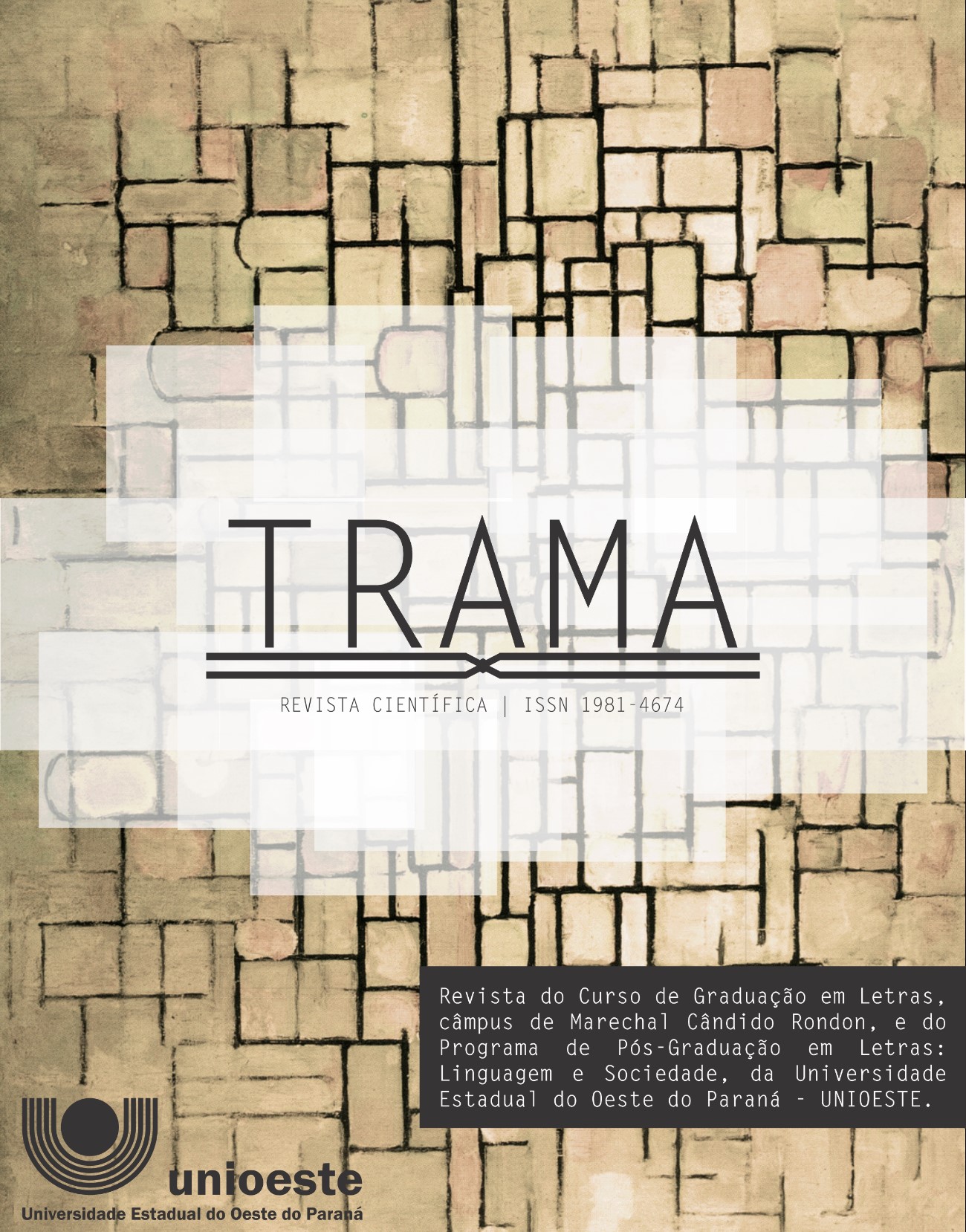UMA ANÁLISE DA FORMA DE TRATAMENTO “DOUTOR” NO CONTEXTO DA CANÇÃO DOUTOR, SIM SENHOR!
DOI:
https://doi.org/10.48075/rt.v18i44.29447Palavras-chave:
Formas de tratamento, Polidez, Análise do DiscursoResumo
O objetivo do presente trabalho é realizar uma análise quanto ao item lexical “doutor”, utilizado no português brasileiro como forma de tratamento, no contexto da letra da canção Doutor, sim senhor!, composta por Marcos Lobato. Buscamos, de forma específica, observar as raízes histórico-sociais do termo, bem como as posições-sujeitos assumidas pelos interlocutores e as relações de poder estabelecidas a partir do uso do termo “doutor” e suas condições de produção no jogo discursivo mais abrangente, refletindo sobre os efeitos de sentido produzidos por seu uso. A análise é desenvolvida sob a luz dos estudos referentes à polidez, pertencentes à área da Pragmática, e da Análise Discursiva de Linha Francesa, destacando-se as contribuições de Foucault (1995, 2006) quanto ao conceito de poder e micropoderes. A metodologia empregada no estudo é de cunho qualitativo-interpretativo, uma vez que o item é investigado em profundidade, considerando-se aspectos históricos e situacionais. Os resultados da análise apontam para a verificação de que o item lexical “doutor” funciona como uma forma de tratamento equivalente a “senhor”, o que sinaliza a existência de uma hierarquia na qual um dos interlocutores detém o poder na interação. No contexto da letra da canção, tal fato aponta para subserviência de trabalhadores cujas profissões são marginalizadas socialmente.
Referências
ALLEN, Ana Sofia Ferreira. O sistema de formas de tratamento em português europeu: contributos para a compreensão da sua reestruturação a partir de textos escritos do século XX. Orientadora: Esperança Cardeira. 2019. 157f. Dissertação (Mestrado) – Faculdade de Letras, Universidade de Lisboa, Lisboa, 2019.
BIDERMAN, Maria Tereza Camargo. Formas de tratamento e estruturas sociais. ALFA: Revista de Linguística, v. 18, 1972.
BOURDIEU, Pierre. A Economia das Trocas Linguísticas. In: Bourdieu - Sociologia. Coleção Grandes Cientistas Sociais. ORTIZ, Renato (org.), vol. 39. p.156-183. São Paulo: Ática. 1983.
BROWN, Roger; GILMAN, Albert. The pronouns of power and solidarity. In: TA, Sebeok (ed.) Style in Language, MIT Press, p. 253- 273. 1960.
CARDELLA, Júlio. Advogado - doutor por direito e tradição. Tribuna do Advogado de Outubro de 1986, pág. 5. Disponível em: https://ricardofatore.jusbrasil.com.br/artigos/239123308/advogado-doutor-por-direito-e-tradicao. Acesso em: 30 jun 2022.
CHARAUDEAU, Patrick. Identidade social e identidade discursiva, o fundamento da competência comunicacional. In : PIETROLUONGO, Márcia. (Org.) O trabalho da tradução. Rio de Janeiro: Contra Capa, 2009, p. 309-326. 2009.
FISCHER, Rosa Maria Bueno. O dispositivo pedagógico da mídia: modos de educar na (e pela) TV. Educação e pesquisa n. 28, v. 1, pp.151-162. 2002.
FOUCAULT, Michel. Ditos e escritos IV. Michel Foucault. Estratégia, poder-saber. Reorganização Manoel Barros da Motta, tradução Vera Lúcia Avellar Ribeiro – 2ed. Rio de Janeiro: Forense Universitário, 2006.
FOUCAULT, Michel. O sujeito e o Poder. In: RABINOW, P.; DREYFUS, H. Michel Foucault. Uma trajetória filosófica. Para além do estruturalismo e da hermenêutica. Rio de Janeiro: Forense Universitária, pp. 231-249. 1995.
MUSSALIM, Fernanda. Análise do discurso. In: MUSSALIM, Fernanda; BENTES, Anna Christina (Orgs.). Introdução à linguística: domínio e fronteiras. 8. ed. São Paulo: Cortez, 2012, p. 113-165..
REICHMANN, Tinka; VASCONCELOS, Beatriz Avila. “Seu Dotô” / Herr Doktor: aspectos históricos e linguísticos do tratamento de Doutor e as conseqüências para a tradução. Pandaemonium germanicum, v. 13, 2009, 146-170.
PINTO, Joana Plaza. Pragmática. In: MUSSALIM, Fernanda; BENTES, Anna Christina (Orgs.). Introdução à linguística: domínio e fronteiras. 8. ed. São Paulo: Cortez, 2012, p. 55-79.
SILVA; Jonathan Chasko da; ARAÚJO, Alcemar Dionet de. A metodologia de pesquisa em Análise do Discurso. Grau zero – Revista de Crítica Cultura, v. 5, n. 1, 2017, p. 17-31.
Downloads
Publicado
Como Citar
Edição
Seção
Licença

Este trabalho está licenciado sob uma licença Creative Commons Attribution-NonCommercial-ShareAlike 4.0 International License.
Aviso de Direito Autoral Creative Commons
Política para Periódicos de Acesso Livre
Autores que publicam nesta revista concordam com os seguintes termos:
1. Autores mantém os direitos autorais e concedem à revista o direito de primeira publicação, com o trabalho simultaneamente licenciado sob a Licença Creative Commons Attribution que permite o compartilhamento do trabalho com reconhecimento da autoria e publicação inicial nesta revista.2. Autores têm autorização para assumir contratos adicionais separadamente, para distribuição não-exclusiva da versão do trabalho publicada nesta revista (ex.: publicar em repositório institucional ou como capítulo de livro), com reconhecimento de autoria e publicação inicial nesta revista.
3. Autores têm permissão e são estimulados a publicar e distribuir seu trabalho online (ex.: em repositórios institucionais ou na sua página pessoal) a qualquer ponto antes ou durante o processo editorial, já que isso pode gerar alterações produtivas, bem como aumentar o impacto e a citação do trabalho publicado (Veja O Efeito do Acesso Livre).
Licença Creative Commons
Esta obra está licenciada com uma Licença Creative Commons Atribuição-NãoComercial-CompartilhaIgual 4.0 Internacional, o que permite compartilhar, copiar, distribuir, exibir, reproduzir, a totalidade ou partes desde que não tenha objetivo comercial e sejam citados os autores e a fonte.


